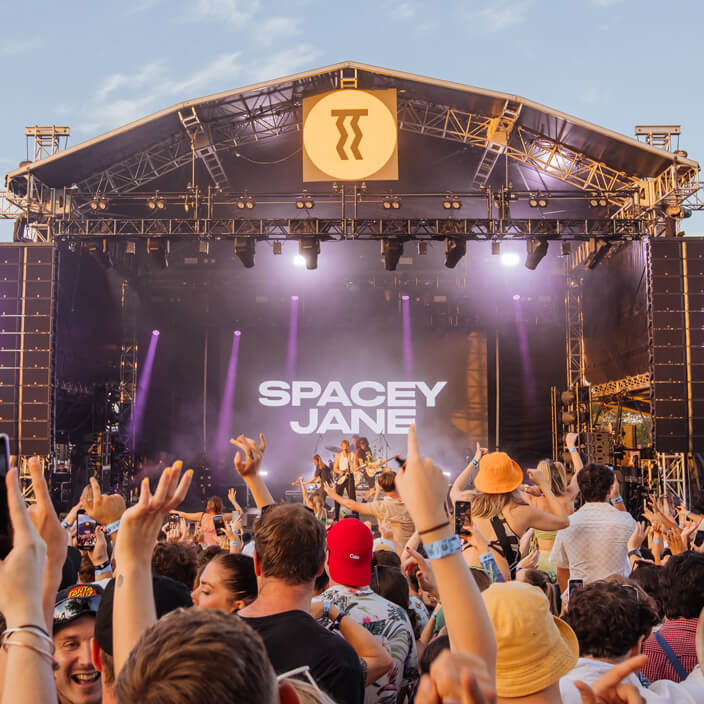To observe the rapid evolution of Queensland’s live music scene, you need only look towards the Comiskey Group’s glistening portfolio of entertainment venues.
There aren’t many event organisers that run their own construction company. This point of difference has given Comiskey Group the freedom to create some of the most electrifying venues imaginable, from Eatons Hill Hotel and Sandstone Point Hotel to the highly anticipated Coochin Fields festival site.
The more we discover about these spaces, the more we realise just how complex the integration of live entertainment really is for Queensland venues. And so, our curiosity led us to seek out how it’s done from the man himself.
Co-founder and director of the Comiskey Group, Rob Comiskey, said well before breaking ground on a new development, they consider the overall live music experience, whether that be a custom stage or a dedicated VIP area for prime viewing.
“By integrating our construction expertise with our entertainment vision, we can create spaces that enhance performances and elevate patron experiences. Our venues are structurally designed for hosting live music, and we follow this through with strategic planning to ensure concerts at our venues are both convenient and enjoyable.
“We are also just willing to give things a go. It was a very uncertain time when the majority of the industry shut down during Covid-19, but we persevered. If we were allowed to host events, we did. We sold the greatest number of tickets across Australia during that time, and this is purely because we were willing to take on the challenge,” he said.
Music has always played a pivotal role in the success of pubs and hotels. Beyond enhancing the overall hospitality experience, uniting people, and fostering a sense of community, it also holds a special significance for local artists. In fact, many well-known musicians, even those who have achieved mainstream success, once honed their skills by performing at local venues.
Rob said these grassroots performances have always served as crucial stepping stones for artists, allowing them to refine their craft, receive community support, and gain valuable feedback from live audiences.
“By supporting local artists, we contribute to their livelihoods, enabling talented musicians to thrive through their artistry. Then there’s the bigger names in music. For me, having Ice Cube play a sold-out gig at Eatons Hill Hotel followed by a sold-out Cyprus Hill show the next night was pretty epic!
“We have had so many iconic artists across our venues. Names like Prince, Post Malone, and Marilyn Manson have graced our stages. We also came out with a bang for the first ever concert at Sandstone Point Hotel, hosting music royalty The Beach Boys. We’ve had every genre imaginable, from country legends like Billy Ray Cyrus to pop sensations like Kesha and rap superstar ASAP Rocky,” he said.
It sounds like a lavish and promising addition to any venue, but designing a space that can accommodate performers and audiences while ensuring safety, functionality, and legislative compliance also involves an insane amount of planning.
When it comes to hosting large-scale events, Rob said venues must consider any noise restrictions specified within their concert approval, abide by liquor licencing permits, ensure a safe means of access and egress, maintain adequate event security numbers, and follow venue capacity limitations.
“Venues must also have clear and accessible emergency exits, properly marked exit signs, and well-designed escape routes.
“When it comes to sound, we optimise acoustics for the environment, considering sound-absorbing materials, diffusers, and proper speaker placement. Soundproofing is a big consideration, especially when preventing sound leakage into neighbouring spaces. We use thick walls, double-glazed windows, and acoustic insulation.
“Designing the appropriate stage size to fit all types of events and band setups also means you are less limited as to what you can and can’t do on stage – an appropriate size is important to be able to have a wider entertainment offering.
“Along with the stage design, we must consider dressing rooms, green rooms, and storage for equipment. The careful consideration of where to place bars, food service areas, and VIP sections is all part of a thoughtfully designed entertainment venue destined for success,” he said.
I think we all know that live music isn’t an easy-going industry by any means, particularly within the last few years, with the pandemic bringing about major restrictions impacting artists, venues, and promoters. The cost-of-living crisis has also been significantly affecting ticket sales, with the expenses associated with organising events more than doubling.
Rob said those in the entertainment business are no stranger to challenges, and have grappled with plenty of show cancellations due to weather events, artist flight delays, and unexpected artist visa denials.
“It’s been a rollercoaster, but we love what we do and wouldn’t change a thing. We surround ourselves with a team that is flexible and remains calm under pressure. Together, we can roll with the punches and face any challenge with a can-do attitude,” he said.
Several interesting new technologies have also emerged in the world of music and events, with one notable trend being the use of advanced audio systems that incorporate immersive sound technologies, such as spatial audio and object-based audio processing.
Rob said these technologies enhance the overall listening experience for audiences, making live performances more engaging and memorable.
“Additionally, there have been advancements in noise-cancelling techniques that benefit both performers and audiences. For example, some venues are implementing acoustic treatments and soundproofing materials to minimise external noise interference and create a more controlled acoustic environment.
“There are even innovative noise-cancelling systems designed specifically for live events that can selectively reduce unwanted sounds while preserving the clarity and impact of the music. These advancements in technology contribute to creating a better audio experience for patrons and performers alike, enhancing the overall appeal and success of live music venues in Queensland and beyond,” he said.
Bringing in local musicians on a weekend really is a no-brainer for many Queensland venues, especially when you consider how live music enhances the atmosphere of any room, supports the local community, and keeps patrons wanting to stay longer. Large-scale music events, however, take significant consideration.
Rob said that, while pulling off a large event is rewarding, it can be extremely challenging and risky, with many venues going broke in the process.
“My advice would be to take calculated risks, assess all factors, listen to your audience, and maintain a level of comfort. Hosting large-scale events can be costly, so it’s important to consider even the worst-case scenario to mitigate your risks.
“In saying that, when an event goes right, there’s almost nothing more rewarding. Watching patrons enjoy the experiences we create or sing along to the artists we worked hard to secure is truly special,” he said.

